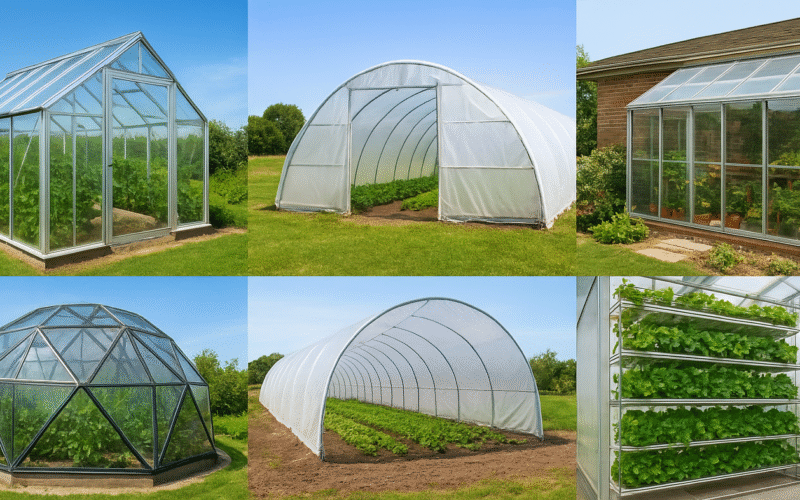Introduction
Have you ever noticed a greenhouse in your locality and wondered why it’s used? Can crops really grow better under such structures? How many types of greenhouses are there? In this article, we’ll answer these questions and explore the various types of greenhouses, their features, and their uses.
A greenhouse is essentially a structure designed to mimic favorable environmental conditions for plant growth. Over time, greenhouse technology has evolved to allow cultivation in almost any climate by providing a controlled environment.
Greenhouses range from small backyard setups to large-scale commercial installations. Whether you are a hobby gardener or a commercial farmer, choosing the right greenhouse can significantly improve crop yield, quality, and sustainability.
Types of Greenhouses Based on Shape
1. Even Span / A-Frame Greenhouse
Description: A classic “A” shaped roof design with ample headroom and excellent stormwater drainage.
Features: Built with glass or polycarbonate panels, ensuring good light distribution and ventilation.
Ideal for: Hobbyists and small-scale farmers with limited space.
2. Quonset Greenhouse
Description: Semi-circular, tunnel-like structures known for strength and stability.
Features: Made of polyethylene stretched over metal frames; withstands windy and snowy conditions.
Ideal for: Commercial growers in harsh climates who want a cost-effective option.
3. Lean-To Greenhouse
Description: Built against an existing structure (house, garage, or shed).
Features: Space-saving, cost-efficient, shares utilities like electricity and heating.
Ideal for: Homeowners with limited yard space or budget.
4. Multispan Greenhouse
Description: Interconnected sections offering scalability and flexibility.
Features: Supports hydroponics, vertical farming, and large-scale production.
Ideal for: Commercial growers and research facilities.
5. Sawtooth Greenhouse
Description: Features sawtooth-shaped roof ridges resembling a saw blade.
Features: Maximizes light penetration and air movement; well-suited for hot climates.
Ideal for: Tropical regions needing year-round light and ventilation.
Other Types of Greenhouses
Gothic Arch Greenhouse
Description: Pointed arched roof for snow shedding and structural strength.
Features: Curved design, maximized headroom, efficient air circulation.
Ideal for: Snow-prone or windy regions.
Geodesic Dome Greenhouse
Description: Dome-shaped structure made of triangular panels.
Features: Strong, energy-efficient, and excellent light diffusion.
Ideal for: Innovative growers focused on sustainability.
Hoop House Greenhouse
Description: Roof supported by bent PVC or metal hoops.
Features: Affordable, easy to build, extends growing seasons.
Ideal for: Small farmers and gardeners on a budget.
Suspended Greenhouse
Description: Elevated or ceiling-hung systems with plants grown upside down.
Features: Space-saving, unconventional cultivation method.
Ideal for: Urban growers experimenting with vertical techniques.
Vertical Greenhouse
Description: Multi-level structures, often hydroponic or aeroponic.
Features: Maximizes productivity in limited land areas.
Ideal for: Urban farmers, restaurants, and commercial growers.
Why Greenhouses Are Needed
Season Extension: Grow crops year-round regardless of climate.
Climate Control: Regulate temperature, humidity, and airflow.
Pest & Disease Protection: Acts as a barrier, improving crop health.
Optimal Light Exposure: Enhances photosynthesis for healthy growth.
Water Conservation: Supports drip or sprinkler irrigation, minimizing waste.
Higher Yield & Quality: Produces nutritious, market-preferred crops.
Space Efficiency: Enables farming in urban and limited spaces.
Research & Innovation: Provides controlled conditions for crop studies.
Localized Food Production: Reduces transportation costs and carbon footprint.
Conclusion
Greenhouses come in many types, each suited for specific crops, climates, and grower objectives. Whether you want to extend your growing season, protect plants from harsh weather, or maximize space in urban settings, there is a greenhouse solution for you.
Though initial construction can be costly, the long-term benefits of higher yield, better crop quality, and sustainability outweigh the expenses. With the right greenhouse type, farmers and gardeners can cultivate crops all year round, ensuring healthy produce and profitable outcomes.

